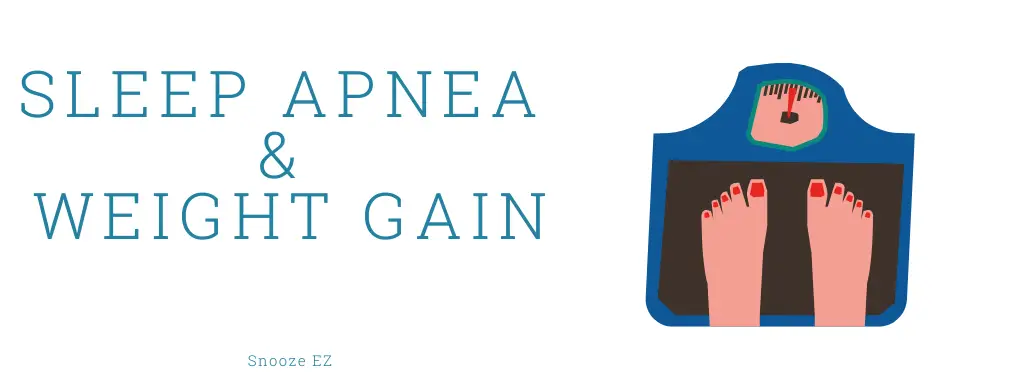Overall, not getting quality sleep is the reason sleep apnea affects weight gain.
Sleep Apnea is a serious medical condition with potentially dangerous consequences that can significantly affect your health.
It is estimated that over 30 million Americans suffer from this disorder, and those who do are at an increased risk of weight gain.
Not only does sleep apnea make it difficult to achieve restful sleep, but the lack of quality sleep can also lead to changes in hormones which can affect metabolism and lead to weight gain.
What is Obstructive Sleep Apnea (OSA)?
Sleep apnea is a sleep disorder that is characterized by abnormal pauses in breathing during sleep, resulting in poor quality sleep and decreased oxygen levels in the blood.
These pauses can last for short or long periods of time and can occur dozens or even hundreds of times per night.
Sleep apnea can have serious health implications if left untreated, such as high blood pressure, increased risk of heart attack or stroke, depression, headaches and fatigue during the day.
People who suffer from this condition may experience loud snoring or gasping for air while sleeping which can be disruptive to their bed partner’s sleep as well.
Some other common signs are feeling tired during the day despite getting enough hours of nighttime rest, difficulty concentrating or remembering things and waking up with a dry mouth or sore throat.
You are more at risk if you are older age, male, drink alcohol, smoke, have a large neck, and are overweight. Though, what exactly causes sleep apnea to affect weight gain?
How Are Sleep Apnea and Weight Gain Related?
Sadly, sleep apnea (OSA) can cause weight gain and vice versa. Research has shown that one can actually make the other worse as well.
Around 70 percent of people diagnosed with obstructive sleep apnea (OSA) are overweight or obese, making this correlation highly concerning.
Studies have shown that an increase in weight increases the risk of developing sleep apnea. Then, if you get sleep apnea, weight gain came become worse making your sleep apnea symptoms even more severe.
Studies also show this to be true when people gained excessive weight right before they were diagnosed.
The exact relationship between OSA and weight gain is not completely clear but there are many theories about how they might be linked to one another.
One theory suggests that due to the lack of oxygen caused by OSA, individuals may become more sedentary which could lead to weight gain over time.
Another theory suggests that hormones released in response to chronic sleep deprivation caused by OSA may influence appetite regulation in those experiencing the condition.
How Does Sleep Apnea Affect Weight Gain?
Good, quality sleep is crucial to our health and everyday life. The same is true when digging into the issue of how sleep apnea can affect weight gain.
Untreated sleep apnea causes disruption in sleep. When sleep is disrupted consistently over time, it starts causing all sorts of havoc on your health, including weight gain. Here are the reasons why:
- Feeling Exhausted – Feeling tired all the time makes you lazy. If you are lazy, then you are definitely not going to be as active as if you were full of energy. This causes weight gain.
- Appetite and Cravings Increase – When you do not get enough sleep because of sleep apnea, your body seeks more energy through food. Immediate energy comes in the form of carbohydrate cravings. Too many carbohydrates is too many bad calories that will increase weight.
- Hormones – Lack of sleep due to sleep apnea causes our hormones to get crazy. Our hormones help regulate our appetite and metabolism. The hormones are leptin, insulin, and gherlin.
- Leptin – This hormone is associated with weight loss. People with sleep apnea have elevated levels of leptin and this means they are more resistant to weight loss as a result
- Gherlin – Hunger is controlled by this hormone. Again, this is higher than normal in sleep apnea patients indicating that you are likely to eat more.
- Insulin – Insulin resistance is also a problem. Insulin controls how much fat we store and regulates sugar which determines if you are diabetic or not.
Does Treating Sleep Apnea Help Weight Loss?
Treating sleep apnea has many benefits, such as feeling more energetic and even extending your life! After going on CPAP (continuous positive airway pressure) treatment, many can’t believe just how much better they feel every day.
Though, does treating sleep apnea directly help weight loss? It is predicted that it definitely helps as a result of getting your hormones back to normal which will help your metabolism and appetite cravings.
It also will make you feel better. Studies show that people who received OSA treatment increased their physical activity resulting in losing weight.
Yet, if you continue eating and living the same way with treatment and expect it to make you lose weight, you more than likely will not see any changes.
Does Losing Weight Help With Sleep Apnea?
Yes! We have a whole article on how diet affects OSA. Weight gain is most often the main cause for sleep apnea.
Another study shows that just by losing 7-10% of your body weight can reduce the symptoms of OSA.
Therefore, if you can go on a diet, exercise, stop smoking, and not drink too much alcohol, you can also either reduce your symptoms of OSA or possibly even cure it!
Conclusion
In conclusion,the relationship between sleep apnea and weight gain is undeniable.
Obstructive sleep apnea can lead to a variety of health issues, including obesity, which further increases the risk for serious chronic diseases and making OSA even more severe.
While there are treatments available to help manage sleep apnea, the best answer is to take preventative measures.
Eating healthy and getting regular exercise are important steps in preventing the development of this disorder.


